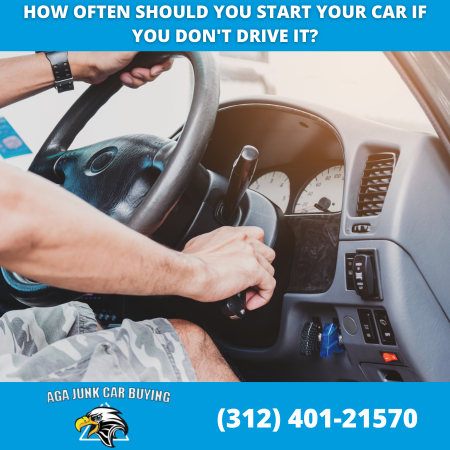Have you ever wondered how often you should start your car if you don’t drive it regularly?
If you own a car but don’t drive it very often, it’s important to know how frequently you should start the engine in order to keep your vehicle running properly.
Not starting your car for long periods of time can lead to accelerated wear and tear on its components, including the battery and other parts of the electrical system.
Whether you have a second car, a seasonal vehicle or just don’t use it often, knowing the best ways to start your car can help you maintain its performance and avoid potential problems.
How often should you start your car if it is parked for a long time?
 If your car spends a lot of time parked, it is recommended to start it at least once a week.
If your car spends a lot of time parked, it is recommended to start it at least once a week.
Starting the car regularly helps keep engine components lubricated, prevents the battery from fully discharging and reduces the risk of certain mechanical problems.
However, it is important to note that specific recommendations may vary depending on factors such as climate, storage conditions and the condition of your car.
Consulting your car’s manual or asking a professional for advice may provide guidance more tailored to your specific situation.
How long can a car be without starting?
Typically, a car can be parked without starting for four weeks to two months without causing major problems.
However, the exact length of time may vary depending on several factors, such as the make, model, age, condition and environmental conditions of the car.
During this time, the battery may gradually lose charge and the fuel may degrade or develop problems.
What happens if you don’t start your car for a long time?
If you don’t start your car for a long time, several things can happen. Here are some potential problems that may occur:
1. Battery discharge:
The battery can gradually lose its charge when the car is not in use.
This can result in a dead battery, making it difficult or impossible to start the car when needed.
2. Fuel system problems:
Fuel can degrade over time, resulting in problems such as clogged fuel lines, fuel pump problems or contaminated fuel.
This can affect the car’s performance and may require repairs or cleaning of the fuel system.
3. Tire damage:
When a car is sitting in one position for an extended period of time, the weight of the vehicle can cause flat spots on the tires.
These flat spots can result in an uncomfortable ride and may require tire replacement.
4. Fluid degradation:
Your car’s fluids, such as engine oil, coolant and brake fluid, can deteriorate over time.
This can affect their ability to lubricate, cool and protect various components, which can lead to engine damage or poor performance.
5. Corrosion and rust:
Moisture can build up in certain areas of the car when not in use, leading to corrosion and rust.
This can affect the bodywork, underbody and various mechanical components, compromising their integrity.
6. Pest infestation:
If a car is parked for an extended period of time without proper protection, it can attract pests, such as rodents or insects that can cause damage to the interior or wiring.
And if your old truck doesn’t start anymore, you can sell it for cash in just one call!
Can the car battery die if it’s not started for a while?
Yes, if a car is not started for a while, the battery can die.
The battery in a car is responsible for providing the electrical power necessary to start the engine and operate various electrical systems.
However, when the car is not in use, the battery gradually loses charge due to factors such as natural discharge and the energy consumed by the car’s electrical components, such as the clock or alarm system.
If the car is left without starting for an extended period, typically several weeks or months, the battery can discharge to a point where it no longer has enough power to start the engine.
But if your car is already damaged from being parked for so long and the battery is already discharged, the best option you have is to sell it for cash with AGA Cash Junk Cars Inc..
We buy cars, trucks, vans and SUVS regardless of their condition, even broken-down.
Contact us (312) 401-2157 today to get top dollar for your car!
How often should you drive your car to maintain the battery?
To maintain the battery’s charge and prevent it from discharging, it is generally recommended to drive the car at least once a week for about 30 minutes.
Driving the car regularly during this time helps to keep the battery in good condition and prevents it from losing charge due to natural discharge or overloading of the electrical system.
It also allows the engine to reach its optimum operating temperature, which helps burn off accumulated moisture or contaminants.
How do you maintain a car that you don’t drive?
If you don’t drive your car often, there are a few steps you can take to help maintain it in good condition.
-
Start the engine:
Starting the engine periodically helps prevent the battery from discharging and keeps engine components lubricated.
Try to start the car at least once every two weeks and let it run for about 25-30 minutes to reach normal operating temperature.
-
Keep the battery charged:
If you don’t drive the car frequently, the battery may gradually lose charge. To avoid this, consider using a battery maintainer or a trickle charger.
These devices can be connected to the battery and provide a constant low charge to keep it properly charged without overcharging it.
-
Clean your car:
Cleaning the exterior and interior of your car regularly helps to prevent corrosion and rust, as well as dirt buildup that can damage certain components.
Make sure to also check for any signs of pest infestation or damage caused by rodents.
-
Store your car properly:
If you are not going to drive your car for an extended period, it is important to store it in a dry and cool place, away from direct sunlight.
This helps protect the car’s components from corrosion or excessive wear and tear due to temperature changes.
-
Covering the car with a tarp can also help keep dirt and moisture out.
It’s also a good idea to take special precautions when parking cars during cold winter months, such as using a battery warmer or protecting certain components with antifreeze.
-
Check fluid levels:
Periodically check your car’s fluid levels, including engine oil, coolant, brake fluid, and power steering fluid.
Make sure they are at the recommended levels and top them up if necessary.
By following these maintenance practices, you can keep your car in good condition even if you do not drive it regularly.
In conclusion, it is generally safe to leave your car without starting for up to two months.
However, during this time, several things can happen that may affect the car’s performance or condition, such as battery discharge, fuel system problems and tire damage.
To help maintain your car in good condition when not driving it regularly, it is important to start the engine periodically, keep the battery charged and store the car properly.
Additionally, check fluid levels and clean both the exterior and interior of your car regularly.
Following some steps ensures that you will be able to start and drive your car whenever needed.
